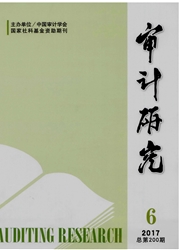

 中文摘要:
中文摘要:
本文基于上市公司年报补充更正的独特视角,深入考察家族控制、审计监督的公司治理效应。研究发现:(1)与非家族上市公司相比,家族上市公司发生年报补充更正的可能性较高;(2)聘任高质量审计师以及获得标准审计意见的上市公司发生年报补充更正的可能性较低;(3)高质量审计师和审计意见在非家族上市公司中更能够揭示财务报告的风险;(4)与非家族上市公司相比,家族上市公司更不愿意聘任高质量审计师,而且更有可能获得“非标”审计意见。上述发现表明,在我国,家族控制并未发挥明显的治理效应,而审计监督则扮演了积极的公司治理角色。进一步地,审计作为一种外部公司治理机制,其治理效应的发挥在很大程度上受公司控制权这种内部公司治理机制的影响。
 英文摘要:
英文摘要:
This paper empirically tests the corporate governance effects of family control and audit supervison based on the unique perspective of supplement and correction announcements. The results show that, (1)family listed companies have higher possibility of restatement; (2)companies that appoint big 10 auditors or receive standard unqualified opinions have relatively lower possibility of restatement; (3)the big 10 auditors and audit opinions reveal the risks of financial reports better in non-family listed companies; (4)family listed companies have lower possibility of appointing big l O auditors or receiving clean opinions. These findings indicate that, family control doesn't bring positive corporate governance effects, while audit supervision plays the corporate governance role in China. Furthermore, whether audit supervision could bring the positive corporate governance effects is affected to a large extent by the internal controlling rights.
 同期刊论文项目
同期刊论文项目
 同项目期刊论文
同项目期刊论文
 期刊信息
期刊信息
